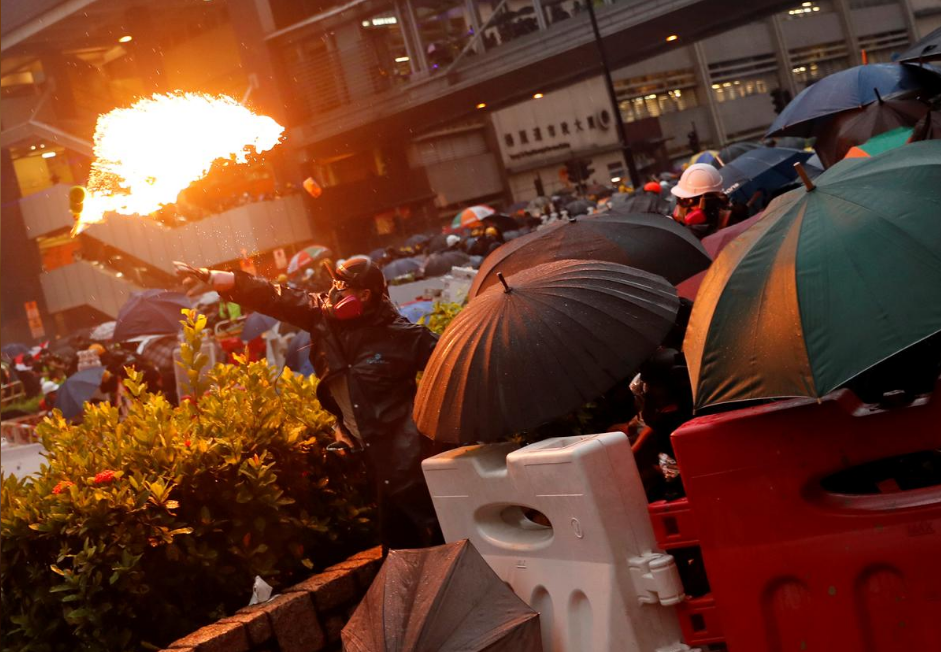
Editor's note: After the National Security Law for the Hong Kong Special Administrative Region (HKSAR) passed, it has ignited debate, but actually if one studies carefully about the articles in the law, he/she may note that it has safeguarded the "One Country, Two Systems." Henry Litton is an ex-judge of the highest court in Hong Kong. The article reflects the author's opinions, and not necessarily the views of CGTN. This is Part I of his analysis.
The announcement made by the Standing Committee of the National Peoples' Congress in May this year that Beijing would enact national security laws for the HKSAR aroused hysteria worldwide.
One wonders whether this came from ignorance or malice.
Every country on earth has national security laws. For more than 20 years, the HKSAR government had failed to implement Article 23 of the Basic Law (the regional constitution for Hong Kong) which required the Region to enact laws "on its own" to prohibit a range of criminal acts aimed at endangering national security.
The announcement in May was against the background of extreme violence lasting many months in the streets of Hong Kong, to the terror of the general population.
Parts of Hong Kong resembled war-zones, with the police under constant attack. Loss to the ordinary residents and to the Region measured in the hundreds of millions of dollars. When COVID-19 intervened in February this year, criminal activity continued though on a diminished scale.
The police force was over-stretched, the justice system overwhelmed. By October last year, after months of turmoil, thousands of arrests had been made but only a handful of persons had been charged and brought to court for trial. An attempt by the Chief Executive to assist the police in identifying culprits, by promulgating a law forbidding face-covering in public gatherings, was knocked back by the High Court.
The declared aim of the rioters was to destroy the police force and bring down the HKSAR administration. There was firm evidence that external hostile forces were behind the movement, fueling and funding the rioters.
The HKSAR had (and still has) in its statute book national security laws left over from the colonial era. But these were totally inadequate to deal with the situation.
The announcement made by the Standing Committee in May noted (with remarkable restraint) that national security risk in the HKSAR had "become a prominent problem."
Seeing that the Regional government was incapable of dealing with the dire situation, failing to protect the lives and livelihood of the ordinary residents, what should the central government do?

Violent protesters throw petrol bombs at the police line as protesters clash with riot police during protests at Tsuen Wan in Hong Kong, August 25, 2019. /Reuters
Violent protesters throw petrol bombs at the police line as protesters clash with riot police during protests at Tsuen Wan in Hong Kong, August 25, 2019. /Reuters
One solution was, obviously, to declare a state of emergency under Article 18.4 of the Basic Law and issue an order applying "national laws in the region," bring in the armed police from across the border and thus end, in effect, the policy of "One Country, Two Systems" as applied to Hong Kong.
The central government chose the opposite course. It enacted the new law. The declared aim was to "fully and effectively implement the principles of 'One Country, Two Systems', 'the people of Hong Kong governing Hong Kong and A high degree of autonomy for the region'."
The May announcement specifically mentioned that in enforcing the law through the Hong Kong courts, common law principles such as the presumption of innocence and other safeguards would apply.
Looking at that announcement broadly, and objectively, what it shows is this: All three branches of Hong Kong authorities – the Executive, the Legislature and the Judiciary – had failed in their functions to safeguard national security. The situation called for urgent action. It thus became necessary for the Central Government, with sovereign responsibilities, to intervene.
Any calm and thoughtful reaction to the May announcement would have been: "Well, given the terrible situation in Hong Kong, all sounds fair and reasonable"; the skeptical critic might have remarked, "Let's see what the actual text of the law says" and he might even have added "The devil is in the details."
But Lord Patten, former governor of Hong Kong, even before the ink was dry, issued an immediate statement declaring this to be "a complete destruction of the Joint Declaration": referring to the agreement between Britain and China signed in December 1984 dealing with China's resumption of sovereignty over Hong Kong in July 1997. This was echoed by statements from other Western leaders. The Western media then picked up the tune.
The text of the new law was eventually published on July 1. A headline in the Economist of July 4-10, 2020, proclaimed "Beijing's assault on Hong Kong." A leading editorial in The Australian (Australia's national newspaper, July 10) bore the title "China scores crushing One Country One System blow."
Item after item, leading news outlets such as the BBC and the ABC voiced the same theme, referring to "pro-democracy demonstrators" as if the new law was aimed at suppressing peaceful protests, without the least reference to the murderous acts and large scale destruction being wrought in Hong Kong.
It is, of course, legitimate to analyze the new law and criticize aspects of it. But a law aimed at "crushing Hong Kong," one of China's most prosperous regions? To weaken one of the foremost financial centers of the world? What purpose would that serve?
(If you want to contribute and have specific expertise, please contact us at opinions@cgtn.com.)